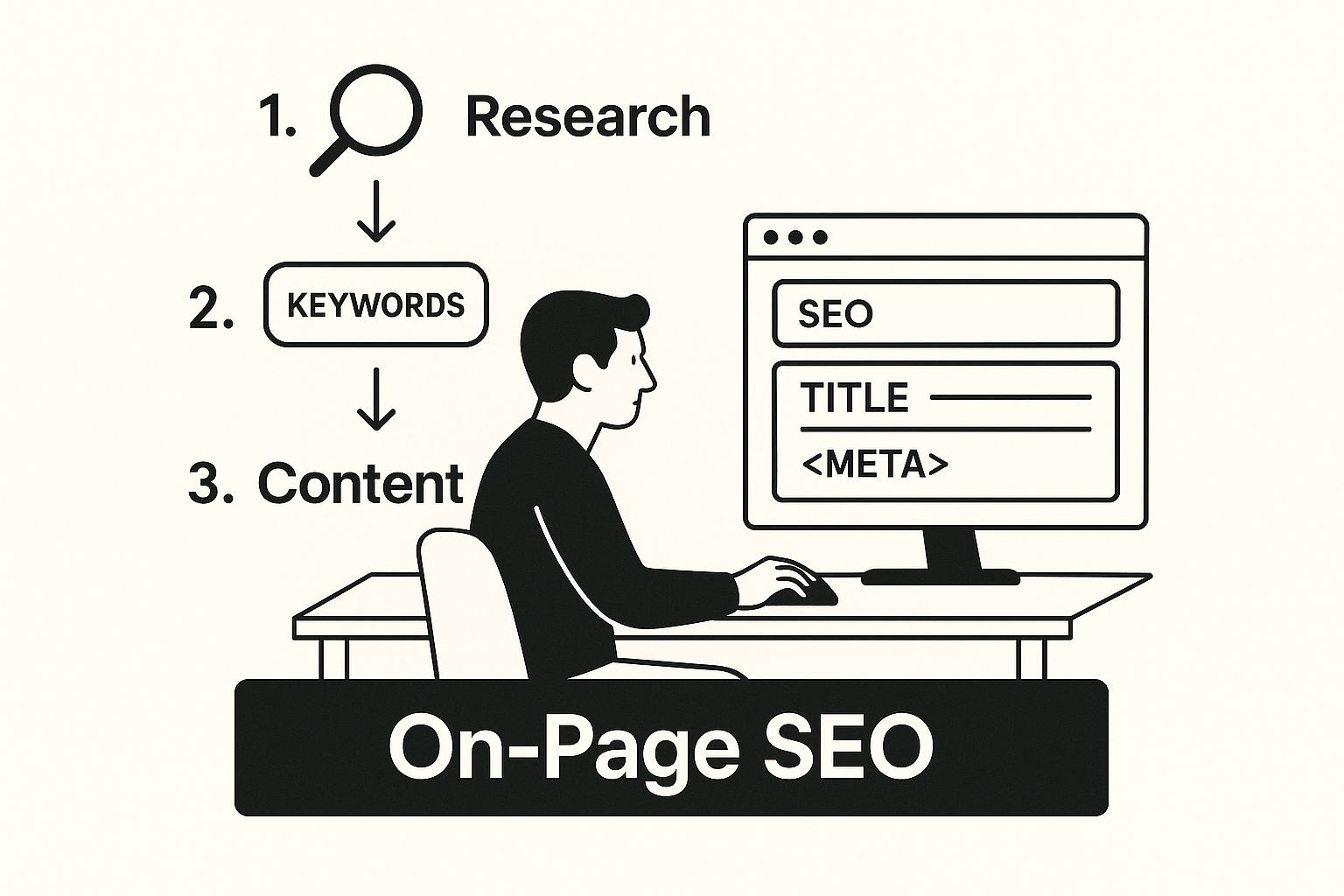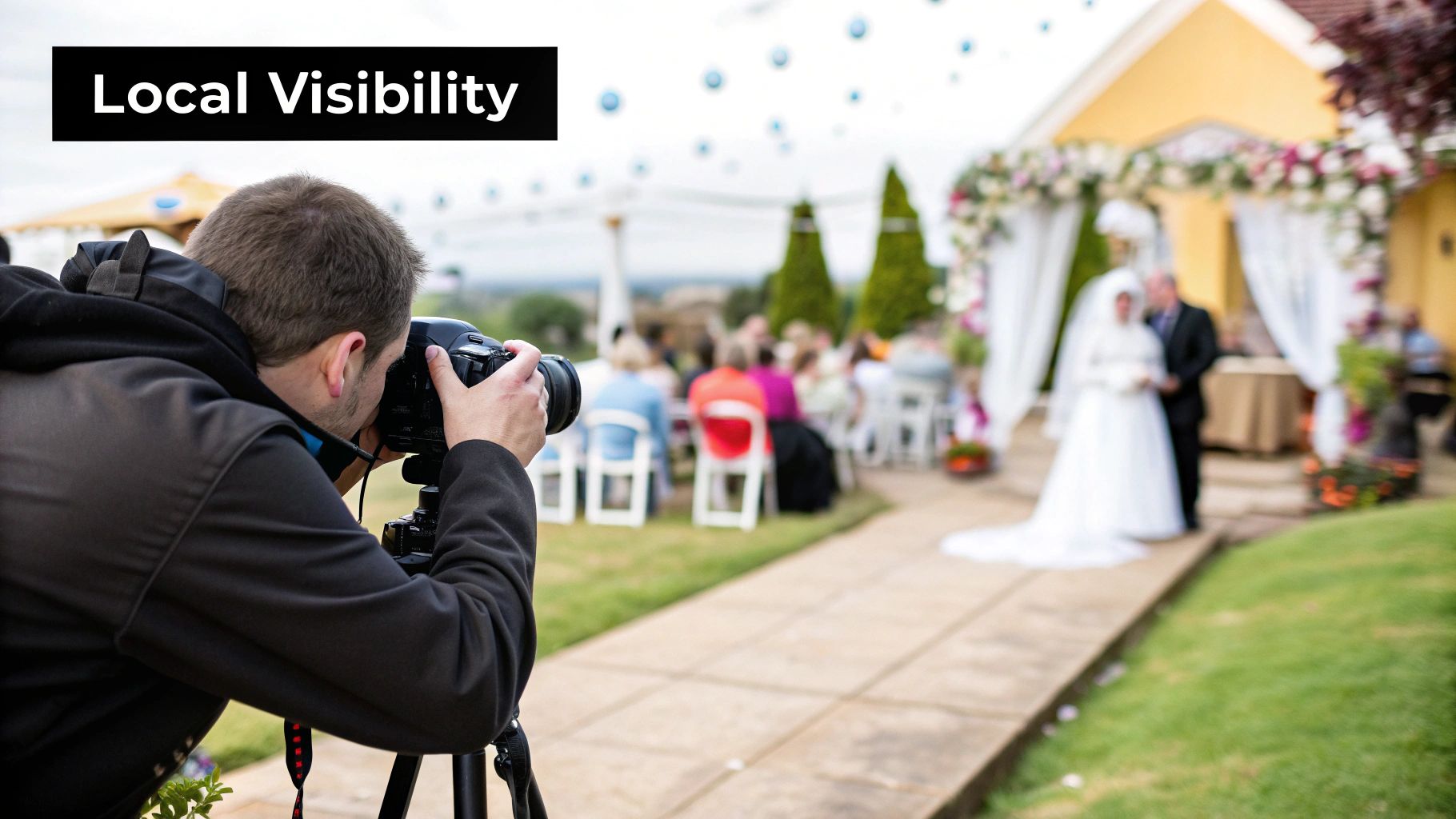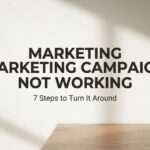Let's face it, the wedding photography world is crowded. So, how do you get noticed? A great portfolio is key, but it doesn't help if your ideal clients can't find it. This is where wedding photography SEO comes in. It’s the engine that turns your website into a magnet for the right kind of couples.
Ready to get your website seen by couples actively searching for you? This guide breaks down wedding photography SEO into simple, actionable steps.
Why SEO is Your Best Friend for Booking Gigs
If you're tired of the social media hustle or ads that don't work, SEO is a better approach. SEO isn't just for tech experts. It's your most direct path to clients who are looking for a photographer just like you. The moment a couple gets engaged, one of their first stops is Google.
They aren't just looking. These couples have high intent. They are on a mission, typing in searches like "adventurous elopement photographer in Colorado" or "light and airy wedding photographer in Charleston." When your website pops up, you're not just another vendor—you're the solution.
In Short: SEO connects you with couples who are ready to hire a photographer, making it a powerful way to grow your business.
The Magic of Page One
Getting your site onto the first page of Google isn't just for show; it's a business necessity. When was the last time you clicked to page two of the search results? Almost never, right? Research shows that a huge 75% of people never scroll past the first page. For a deep dive, this guide on seospace.co is a great resource.
This means if you're not showing up for "wedding photographer [your city]," you're invisible to most potential clients.
Building Something That Lasts
Here’s the best part: unlike paid ads that stop when you stop paying, the work you put into SEO grows over time. That blog post you publish about a beautiful venue? It can continue to attract and book clients for years.
A solid SEO strategy will:
- Bring in better leads: Connect with couples already looking for your style and location.
- Establish you as the expert: Ranking high on Google signals trust and authority.
- Lower your ad spend: As organic traffic grows, you can rely less on paid ads.
- Create a steady stream of inquiries: Say goodbye to the feast-or-famine cycle. Good SEO brings a more predictable flow of clients.
Ultimately, using wedding photography SEO is about shifting from chasing clients to attracting them. It frees you up to spend less time marketing and more time behind the camera.
Finding Keywords Your Ideal Couples Actually Use
Okay, let's figure out what your dream clients are typing into Google. This is less about being a tech wizard and more about being a detective. Going beyond "wedding photographer in [your city]" is where you'll find couples ready to book.
We’re talking about long-tail keywords. These are longer, more specific phrases that show someone knows what they want. Think less "NYC photographer" and more "moody wedding photographer for a Brooklyn rooftop elopement." When someone searches with that much detail, they're looking to hire.
Brainstorming Your Core Keyword Buckets
Before using any tools, start with what you know best—your business and your ideal client. Grab a notebook and jot down ideas in a few categories.
- Your Style: Are you light and airy? Dark and moody? Photojournalistic? Candid? Write down words couples use to describe your work.
- Your Location: Don't just list your main city. Include specific neighborhoods, nearby towns, and popular regions you serve. Think "downtown Austin wedding" or "Hill Country elopement."
- Venues You Love: List every venue you’ve shot at or want to shoot at. Couples search for photographers who know their venue. Something like, "Ashton Gardens Houston wedding photographer" is a goldmine.
- Wedding Types: Do you specialize in elopements, micro-weddings, church ceremonies, or specific cultural weddings? Each is a keyword you can own.
This first list doesn't have to be perfect. The goal is to get ideas flowing.
Using Free Tools to Find Keyword Gems
You don't need to spend a lot of money on software. Some of the best tools are free.
A simple place to start is Google's search bar. Type a phrase like "Atlanta wedding photographer" and see what Google suggests in the auto-complete dropdown. These are real searches people are making.
Then, scroll to the bottom of the search results page. You'll find the "People Also Ask" and "Related searches" sections. These are great for finding question-based keywords and other long-tail ideas.
Keep in mind that trends change. For instance, wedding industry SEO data showed searches for 'blurry wedding photo trend' increased by 3,500% in 2024. At the same time, 'Italy wedding venues' saw a 450% jump. This shows how quickly specific styles and locations can become popular.
What are good keywords for a wedding photographer?
Good keywords are specific and show a couple is close to making a decision. Instead of a broad term like "wedding photographer," target phrases with a location, a style, or a specific need. For example, "candid documentary wedding photographer in San Diego" is strong because it speaks to a niche client.
How do photographers do keyword research?
Most photographers start by brainstorming their specialty and location. Then, they use tools like Google Keyword Planner (free with a Google account), Ubersuggest, or Google search to find related terms. It's also helpful to see what your competitors are ranking for. Our comprehensive guide to SEO for wedding photographers covers this in more detail.
How do I find my SEO keywords?
Finding your keywords involves brainstorming and research. Start by listing terms related to your services, style, and locations. Then, use a keyword research tool to check search volume and find new phrases. Focus on keywords with clear intent that match what you offer. For instance, if you love shooting at rustic barns, a keyword like "Texas barn wedding venues" is perfect for a blog post.
Making Your Website Pages Irresistible to Google
Alright, you have a great list of keywords. Now what? It's time to use them on your website. This is how you tell Google exactly what each page is about, making it easier for clients to find you.
This process is called on-page SEO. It's about placing your keywords in key spots on your site. Think of it like labeling sections in your portfolio. You're making it clear what people will find on each page.
Your First Impression: SEO Titles and Meta Descriptions
Your SEO title and meta description are your handshake with Google. They are the headline and short summary that appear in search results. Their job is to get someone to click on your link.
A good SEO title is clear and has your main keyword in it. Instead of "Homepage," use something specific like "Boulder Wedding Photographer | Sarah Evans Photography."
The meta description is your mini-billboard. It doesn't directly affect rankings, but a good one can increase clicks. Briefly explain what the page offers and give a reason to check it out.
Here's how you might edit these details in a website builder.

Making these changes is usually simple. It’s a small update that can make a big difference.
In Short: Your SEO Title and Meta Description are what users see in Google search results. Make them clear and compelling to get more clicks.
Your On-Page SEO Cheat Sheet
Use this quick reference to nail the on-page SEO basics for any page on your photography website.
| Website Element | What to Do | Quick Example |
|---|---|---|
| SEO Title | Include your primary keyword, location, and brand name. Keep it under 60 characters. | "Vail Mountain Wedding Photographer | Aspen Photo Co." |
| Meta Description | Write a compelling summary of the page. Include a call to action. Keep it under 160 characters. | "Capturing epic, candid moments for adventurous couples getting married in Vail." |
| H1 Heading | Use your primary keyword in the main on-page headline. Only one H1 per page. | "An Adventurous Wedding at The 10th on Vail Mountain" |
| Image Alt Text | Describe every image for search engines and accessibility. Use keywords naturally. | "Bride and groom kissing on a ski lift at their Vail wedding." |
| Internal Links | Link to other relevant pages on your site (e.g., from a blog post to your portfolio or contact page). | "…check out more from this beautiful day in my Vail Weddings Portfolio." |
Following these basics sends strong signals to Google about what you do and where you do it.
Give Your Content Structure with Headings
Headings (H1, H2, H3) are the skeleton of your webpage. They break up your text, making it easier to read. They also give Google a clear outline of your content.
Every page needs one H1 tag. This should be your main headline and should include your primary keyword. Use H2s and H3s to organize the rest of your content.
- H1 Tag: The main event. For example: "Candid Wedding Photographer in San Diego."
- H2 Tags: Your main sections. Think: "My Wedding Photography Style" or "San Diego Wedding Packages."
- H3 Tags: Sub-topics. For instance: "Elopement Packages" or "Full-Day Coverage."
This hierarchy is a simple but effective way to guide visitors and search engines.
Don't Forget Alt Text for Your Images
As a photographer, your images are your business. But Google can’t see them. That’s where alt text comes in. It’s a short, written description you add to each image.
Alt text is important for two reasons:
- Accessibility: It describes the image for visually impaired users who use screen readers.
- SEO: It tells Google what an image is about, helping your photos show up in Google Images search. This can be a huge source of traffic.
The key is to be descriptive, not spammy.
Good Alt Text: "Bride and groom laughing during their sunset wedding ceremony at Laguna Gloria in Austin."
Bad Alt Text: "wedding photographer austin texas wedding photos best austin photographer"
This small step can make a big difference in your wedding photography SEO strategy.
Weave a Web of Internal Links
Internal linking is linking from one page on your website to another relevant page on your site. It’s one of the easiest and most powerful SEO tactics.
Why does it work? First, it keeps people on your site longer, guiding them from a blog post to your portfolio, then to your contact page. Second, it helps Google discover all your pages and understand how they relate to each other.
For example, if you blog about a wedding at "The Greenhouse at Driftwood," you should link back to your main portfolio page. It's a natural next step for a potential client and a great signal to Google.
Winning Your Local Market with Local SEO
Let's be real—most of your clients are getting married nearby. Showing up in local search results is the core of a smart wedding photography SEO strategy. When a couple in your town searches for a photographer, you want your name to be the first one they see.
Your most powerful tool for this is your Google Business Profile (GBP). Think of it as your digital storefront on Google. It’s often the first thing a potential client sees in Google Search and on Google Maps.
Your Google Business Profile Is Non-Negotiable
Your GBP is where couples find your hours, browse photos, read reviews, and get directions. Not taking it seriously is like locking the front door to your studio.
To own your local search results, optimizing your GBP is key. Feed Google as much accurate information as you can. If you're starting from scratch, this is a great resource: 5 Simple Steps To The Perfect Google Business Profile.
A top-tier profile includes:
- The Right Categories: Your primary category should be "Wedding photographer." Add secondary ones like "Photographer" or "Elopement photographer" if they fit.
- Geotagged Photos: When you upload photos, make sure location data is attached. This tells Google where you work.
- A Compelling Description: Weave in your keywords while talking about your style, service areas, and what makes you unique.
- Services List: Get specific. List everything you offer, from engagement sessions to full-day wedding coverage.
Getting these details right helps Google show your profile to the right couples.
The Power of Client Reviews
Reviews are the lifeblood of local SEO. They provide social proof and signal to Google that you're an active, trusted business. Reviews are a major factor for ranking in the local map pack.
Don't be shy about asking for reviews. Make it a standard part of your post-wedding workflow. A few weeks after you deliver the gallery, send a direct link to your happy couples.
Also, respond to every review. It shows you’re engaged and value client feedback.
Why Does My Photography Business Not Show Up on Google Maps?
If you’re not showing up on Google Maps, it's usually due to a few common issues. First, your Google Business Profile might be incomplete or unverified. Second, you may not have enough "local signals," like consistent business info across the web or enough local reviews. Finally, you could be in a very competitive area.
How Do I Get My Photography Business on Google?
It starts with creating a Google Business Profile. Fill out every section with 100% accurate information, upload high-quality photos, and get the profile verified. After that, focus on gathering reviews and making sure your business name, address, and phone number are identical everywhere online.
How Do I Create a Google Business Page for My Photography?
It's easy. Go to google.com/business and follow the prompts. You’ll enter your business name, location (or a service area), and contact info. Be sure to select "Wedding photographer" as your primary category.
Keeping Your Business Info Consistent
Google looks for clues across the web to confirm your business information. Your Name, Address, and Phone number (NAP) needs to be identical everywhere. That includes your website, Facebook page, Instagram bio, and directories like Yelp or The Knot.
Even small differences—like "St." on your website but "Street" on Yelp—can confuse search engines. Do a quick audit to find and fix these errors. This is a key step for anyone exploring local SEO services for small business.
Create Location-Specific Pages on Your Website
If you serve several cities, create dedicated pages on your website for each one. For instance, a page titled "Asheville Wedding Photographer" speaks directly to couples planning a wedding there.
On these pages, you can:
- Showcase a portfolio of weddings from Asheville.
- Write about your favorite local venues.
- Share insider tips for shooting in that location.
- Feature testimonials from local couples.
This strategy creates a better experience for visitors and helps you rank for specific local keywords.
Blogging That Actually Books You More Weddings
Your blog is your most powerful SEO tool. Stop treating it like an online photo album. Think of it as your secret weapon for attracting couples early in their planning process.
When you create content that helps couples plan their day, you build trust and become a go-to expert. Every blog post is a new chance to rank for keywords your ideal clients are searching for.
Ditch the Portfolio Dumps for Helpful Resources
A blog post with 50 photos captioned "John and Jane's beautiful wedding at Venue X" isn't very helpful. It doesn't tell Google what the post is about, and it doesn't give a couple the information they need.
The magic happens when you shift your mindset. Create posts that answer questions, solve problems, or give a behind-the-scenes look at a venue. This turns your blog into a lead-generating machine.
In Short: Write blog posts that solve problems for couples. This builds trust and attracts qualified leads to your website.
Blog Post Ideas That Get Clicks
So, what should you write about? Put yourself in your clients' shoes. They are Googling for venues, planning tips, and inspiration. Your blog is the perfect place to meet them.
Here are a few ideas that work well:
-
Go Deep on Venues. Create a full feature about a specific venue. Talk about the best spots for portraits, lighting challenges, and what makes the place special. The keyword becomes the venue name, like "An Addison Grove Wedding Guide for Couples."
-
Create "Best Of" Listicles. These are SEO gold. Think about posts like "My Top 5 Outdoor Wedding Venues in Austin" or "A Photographer's Guide to Planning a Rainy Wedding Day." This content solves a big problem for couples.
-
Answer Their Burning Questions. Turn frequently asked questions into blog posts. Topics like "Should We Do a First Look?" or "How to Create a Stress-Free Wedding Day Timeline" are things people are actively searching for.
By creating this kind of valuable content, you'll start ranking for long-tail keywords your competition is ignoring.
How Do I SEO My Photography Blog?
SEO your blog by being helpful and focusing each post on a specific topic or keyword. Use a descriptive, keyword-rich title, like "An Intimate Elopement at Chapel Dulcinea." Write content that offers tips, shares insights, or showcases a venue. And always use descriptive alt text on your images.
How Often Should a Photographer Blog?
Consistency is more important than frequency. Aim for one or two high-quality, in-depth blog posts per month. A couple of well-researched posts will do more for your SEO than four short, image-only posts. A simple social media calendar template can help you plan your content.
Are Blogs Still Good for SEO?
Absolutely. An Instagram post has a lifespan of about 24 hours. A well-written blog post is a long-term asset that can bring you traffic and leads for years. It’s the best way to target specific, long-tail keywords. For a deeper dive, check out this guide on SEO for photographers.
The Anatomy of a Perfect Blog Post
Every post needs a solid structure to keep readers engaged and give Google the right signals.
-
A Killer, Keyword-Focused Title: Your title should grab attention and include your target keyword. "Vibrant Summer Wedding at The Vineyards at Chappel Lodge" works well.
-
A Hooky Intro: Jump right in. Share a quick, personal story about the couple or a unique moment from the day.
-
The Story & The Nitty-Gritty: Provide real value. Talk about the venue, mention other vendors (and link to them), and share helpful details.
-
Lots of Optimized Images: Break up your text with gorgeous images, and make sure every one has descriptive alt text. For example: "bride and groom share first dance at The Vineyards at Chappel Lodge."
-
A Clear Call to Action: Tell the reader what to do next. A simple "Love this Hill Country wedding? See more of my work here, or get in touch!" works wonders.
Building Authority with Backlinks and Features
So far, we've covered what you can do on your website. To really climb the Google rankings, you need to build authority. Think of it like your reputation. In SEO, reputation is built with backlinks.
A backlink is a link from someone else's website to yours. When a big wedding blog or a local venue links to your portfolio, Google sees it as a vote of confidence. This signal can boost your rankings.

But not all links are equal. A link from a major publication like Junebug Weddings is SEO gold. A link from a spammy directory is not. Your goal is to earn high-quality, relevant links.
How to Get Backlinks Without Being Spammy
Forget about emails promising to sell you 1,000 links for $50. That's a fast way to get penalized by Google. Real link-building is about genuine relationships and creating work people want to share.
Here are a few ways to build your backlink profile the right way:
- Submit Your Work to Wedding Blogs: Blogs like The Knot, Style Me Pretty, and smaller niche blogs are always looking for real weddings to feature. A feature almost always comes with a link back to your site.
- Write Guest Posts for Other Vendors: Reach out to florists, planners, or venues you love working with. Offer to write a guest post for their blog, like "A Photographer's Guide to Flawless Wedding Day Timelines." You get a valuable backlink and exposure to their audience.
- Get Featured in Local Publications: Don't forget your local scene! Local magazines and city lifestyle blogs often look for content. Pitch a story about a wedding at a landmark venue or offer your expert tips on local trends.
In Short: Earning high-quality backlinks from reputable wedding websites is a powerful way to show Google your site is an authority.
What are the best backlinks for photographers?
The best links come from websites in the wedding industry. This includes major publications (Martha Stewart Weddings, Brides), popular niche blogs that match your style, and the websites of top local vendors you work with—planners, venues, and florists. A link from a trusted source tells Google you're an expert.
How do I get my photography featured on blogs?
Start by making a list of blogs that feature work similar to yours. Read their submission guidelines carefully. Most editors have specific requirements. They usually want a curated gallery and a compelling story about the couple's day. Personalize your pitch and explain why your wedding is a perfect fit for their blog.
What is a good backlink strategy?
A solid backlink strategy is about diversity and relationships. You want a mix of features on big publications, guest posts on vendor blogs, and mentions in local directories. The key is to be consistent and prioritize quality over quantity. One great link is worth more than a hundred low-quality links.
Common Questions About Wedding Photography SEO
Diving into SEO can feel like learning a new language. It's normal to have questions. Let's tackle some of the most common ones.
How long does it take for SEO to actually work?
The honest answer is: it depends. SEO is a marathon, not a sprint. You might see small wins in the first few weeks, but you should expect to see meaningful results that bring in inquiries in about 3 to 6 months.
Several factors affect this timeline:
- Your Market: Ranking in a big city like New York is harder than in a smaller town.
- Your Effort: How consistently you blog and build links makes a big difference.
- Your Starting Point: A brand-new website starts from scratch. An established site has a head start.
The key is patience. The work you do today builds a foundation for a steady stream of leads for years to come.
Can I do my own SEO, or should I hire an expert?
You can absolutely do your own SEO, especially when starting out. Understanding the fundamentals is one of the most valuable things you can do for your business.
By following the steps in this guide, you can handle the core tasks:
- Finding the right keywords.
- Writing solid page titles and image alt text.
- Setting up your Google Business Profile.
- Blogging about venues and sharing tips for couples.
Later, you might want to hire an expert to take things to the next level. But having that foundational knowledge will make you a smarter business owner.
What's more important: my blog or my portfolio?
Great question! They are both critical but serve different jobs for your SEO.
Your portfolio pages are your heavy hitters. These are your "money" pages, focused on converting clients ready to book. You'll optimize these for your main keywords like "San Diego wedding photographer."
Your blog is your discovery engine. It casts a wider net, targeting hundreds of specific, long-tail keywords. A post about "Balboa Park Wedding Photos" can attract couples just starting their venue search. They find you through the blog, love your work, and then head to your portfolio. The best strategy uses both together.
At Clicks Geek, we specialize in turning your website into a powerful lead-generation tool with expert SEO and web design. If you're ready to stop chasing clients and start attracting them, let's talk. https://clicksgeek.com
Want More Leads for Your Business?
Most agencies chase clicks, impressions, and “traffic.” Clicks Geek builds lead systems. We uncover where prospects are dropping off, where your budget is being wasted, and which channels will actually produce ROI for your business, then we build and manage the strategy for you.






